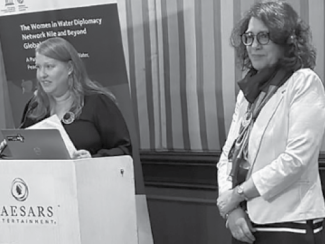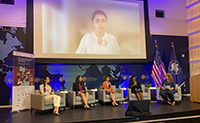ELI Report
More than 150 women forge North American branch of global water diplomacy and governance collaboration
Recognizing the urgent need for inclusive water governance on the continent, leading female diplomats have established the North American Women in Water Diplomacy Network. With support from a variety of stakeholders, including Indigenous community leaders, WWDN will establish a regional structure anchored in the Colorado River basin. It will include Indigenous leadership in alignment with the network’s “Path Forward for Women, Water, Peace, and Security” global strategy.
ELI’s partnership with WWDN is a critical part of the Institute’s work to create good governance of water resources. For its part, the network represents a collaborative effort among female decisionmakers and other experts in transboundary water management. Originating in the Nile Basin in 2017, the coalition has partnerships in Asia, Africa, Europe, and the Americas to help amplify women’s voices in water governance, especially addressing the significant underrepresentation of women in decisionmaking roles.
At the December launch event for the North American section, speakers included water commissioners, government officials, and tribal leaders. They underscored the value of collaborative efforts across the Colorado basin to elevate women’s knowledge and experiences in water governance. It marked a pivotal moment, bringing together approximately 150 water policy experts and decisionmakers to emphasize the importance of gender-inclusive approaches in water diplomacy.
The event facilitated networking opportunities, providing a platform for participants to exchange ideas and insights. Additionally, it showcased statements of support from contributing partners and sponsors, affirming the widespread commitment to advancing gender equality in water governance.
Looking ahead, the network is promoting advocacy and partnership through a series of activities, such as informational sessions, consultation workshops, and publication launches—all aimed at global collaboration among women water leaders.
Through these emerging initiatives, WWDN seeks to empower women, enhance their participation in decisionmaking processes, and promote sustainable water management practices worldwide.
ELI will continue to support the network with high-quality research, specifically looking to connect the dots between the Institute’s work on water tenure and gender-equitable water governance.
Wetlands Program’s multi-pronged approach to conservation

February 2 marked World Wetlands Day, always an opportunity to highlight the importance of these critical ecosystems across the globe, as well as the work being done to preserve and restore them. To celebrate, ELI released a new podcast episode with the director of the Institute’s Wetlands Program, Rebecca Kihslinger, along with Staff Attorney Therese Wilkerson and Research Associate Jesse Ferraioli.
The podcast discussed the program, which takes a three-pronged approach: research, stakeholder engagement, and educational outreach. The program analyzes laws and policies and provides tools for wetlands programs at various levels and locations.
The program emphasizes the importance of wetlands as critical ecosystems that provide many important benefits for people and wildlife and are integral to local communities’ cultures and economies. Wetlands benefits include flood protection, resilient infrastructure, carbon storage, and increased water quality.
To help spread the message, ELI hosts the annual National Wetlands Awards, a program that honors individuals who have done extraordinary work in wetland science, conservation, and community engagement.
The Supreme Court’s 2023 Sackett v. EPA decision has made wetland protection more critical than ever before. Accordingly, recent ELI projects include a review of state wetland programs and evaluation of compensatory mitigation under the Clean Water Act. The emphasis on state and local work also includes stakeholder engagement, like a recent workshop that brought together professionals from resource agencies and federal, state, and local emergency managers to discuss methodologies for prioritizing wetlands restoration.
Building more effective local peacebuilding interventions
Climate change exacerbates global tensions and creates new challenges for policymakers, making it a significant factor in shaping domestic and international relations. An evolving field known as environmental peacebuilding provides pathways to address the intersection of environmental issues, conflict, and efforts toward peace. It is a challenging endeavor, combining different objectives and metrics to address possible interventions.
To assist progress in conflict zones, ELI has published the Toolkit on Monitoring and Evaluation of Environmental Peacebuilding. The toolkit offers guidance to practitioners on establishing and executing monitoring and evaluation (M&E) systems for interventions that intersect with environment, conflict, and peace.
M&E fosters accountability to intervention participants and beneficiaries, within organizations and to peers. Moreover, it supports learning, which is essential for improving future intervention designs and implementations, as well as providing early warning in the often dynamic and volatile contexts where environmental peacebuilding occurs.
Structured around the intervention cycle, the toolkit comprises chapters on design, monitoring, evaluation, and learning, offering guidance on framing outcomes, developing theories of change, designing M&E approaches, selecting indicators, and managing data collection and analysis.
The toolkit also addresses emerging issues such as big data and geospatial analysis, making it accessible to practitioners from diverse backgrounds.
150 North American Women Join Water Diplomacy.
